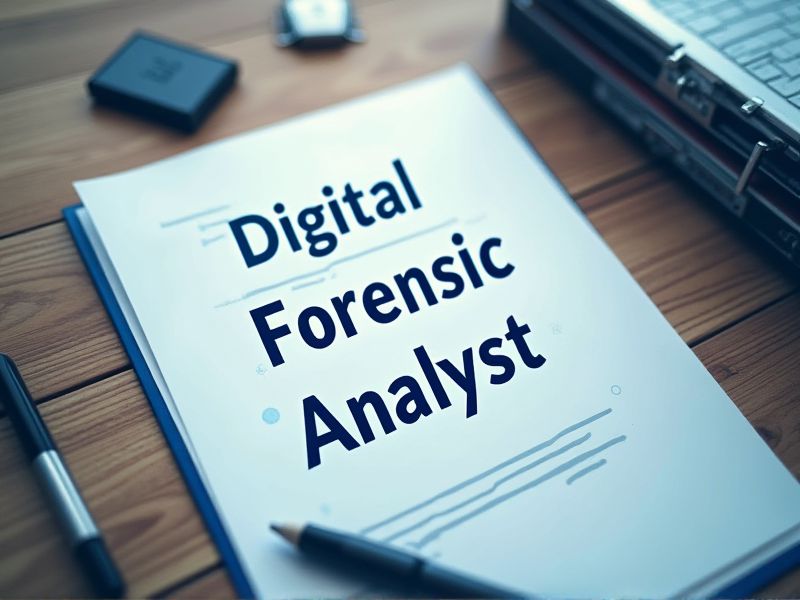
Digital forensic analysts often require certain certifications to ensure they possess the necessary skills to handle and analyze digital evidence effectively. Organizations and law enforcement agencies rely on certified professionals to maintain standards in evidence collection and data integrity. Certifications validate a professional's expertise in the latest tools and techniques needed for investigations. Consideration of these factors leads to the importance of certifications such as Certified Computer Examiner or Certified Forensic Computer Examiner for those entering the field.
Certified Computer Examiner (CCE)
A Certified Computer Examiner (CCE) is needed for a Digital Forensic Analyst to ensure competency in identifying, collecting, and preserving digital evidence in line with legal standards. Earning a CCE credential boosts credibility, which is crucial when presenting findings in a court of law. The certification provides updated knowledge on digital forensic methodologies, enabling analysts to tackle the evolving landscape of cybercrime effectively. Regulators and clients often trust analysts with a CCE credential more readily, given the rigorous testing and adherence to industry best practices it signifies.
Certified Forensic Computer Examiner (CFCE)
A Certified Forensic Computer Examiner (CFCE) enhances a Digital Forensic Analyst's credibility by providing validation of their skills through recognized certification. The CFCE credential ensures adherence to established standards and methodologies crucial in legal proceedings involving digital evidence. The continually evolving nature of cyber threats necessitates advanced expertise, which CFCE certification offers through ongoing education and training. Employers and agencies seeking to mitigate risks related to cybercrime increasingly prefer or require CFCE-certified professionals for quality assurance.
GIAC Certified Forensic Analyst (GCFA)
Obtaining the GIAC Certified Forensic Analyst (GCFA) credential validates the skills of a Digital Forensic Analyst in handling complex cases involving cyber threats and incidents. With the rise of sophisticated cyber attacks, organizations increasingly require forensic experts who can efficiently analyze and interpret digital evidence. GCFA certification equips analysts with up-to-date methodologies and tools essential for conducting thorough cyber investigations. Many employers in cybersecurity sectors prefer or mandate this certification to ensure their teams are capable of responding to incidents with a high level of competency.
GIAC Certified Incident Handler (GCIH)
A Digital Forensic Analyst needs the GIAC Certified Incident Handler (GCIH) certification because it provides essential skills in handling security incidents effectively. GCIH training equips analysts with the ability to identify, contain, and remediate threats, which are critical steps in digital investigations. With a deeper understanding of attacker tactics, an analyst can better trace and analyze evidence, bolstering the overall forensic process. The certification enhances credibility and trust in an analyst's capability to manage complex cybersecurity incidents.
EnCase Certified Examiner (EnCE)
The EnCase Certified Examiner (EnCE) credential validates a Digital Forensic Analyst's expertise in using EnCase forensic software, a leading tool in the industry. This certification often enhances an analyst's credibility and marketability, as it demonstrates proficiency in handling complex forensic investigations. Organizations dealing with sensitive digital data frequently require certified professionals to ensure accurate and reliable analysis. The structured training for EnCE equips analysts with practical skills necessary to navigate and interpret digital evidence efficiently.
AccessData Certified Examiner (ACE)
Obtaining the AccessData Certified Examiner (ACE) credential validates an analyst's proficiency in using forensic tools, enhancing their credibility in the digital forensics field. As technology evolves, complex cybercrimes become more frequent, and ACE certification ensures that a digital forensic analyst is well-equipped to handle these challenges effectively. Organizations often seek certified professionals to minimize risk and ensure accurate investigations, leading to a higher demand for ACE-certified analysts. Data integrity and accuracy are paramount in digital investigations, which ACE certification helps uphold through rigorous training and assessment.
Certified Cyber Forensics Professional (CCFP)
Digital Forensic Analysts require the Certified Cyber Forensics Professional (CCFP) certification as it demonstrates deep knowledge and expertise in various forensic disciplines. The CCFP enhances credibility and trustworthiness among peers and clients, critical traits for investigations and legal proceedings. Having CCFP facilitates staying updated with current methodologies and technologies in the ever-evolving field of cybercrime. Earning certification often leads to improved career opportunities and potential for higher compensation within the cybersecurity domain.
Certified Digital Forensics Examiner (CDFE)
A Certified Digital Forensics Examiner (CDFE) provides assurance of an individual's expertise in handling and analyzing digital evidence with precision and adherence to legal standards. Having CDFE certification enhances a Digital Forensic Analyst's credibility, crucial for court testimonies and maintaining integrity in investigations. Employers often seek certified professionals to minimize risks of procedural errors that could compromise evidence validity. The certification equips analysts with up-to-date methodologies and tools necessary for evolving digital threats.
Certified Information Systems Security Professional (CISSP)
The CISSP certification provides Digital Forensic Analysts with a comprehensive understanding of security principles, which is crucial for investigating cybersecurity incidents. Mastery of CISSP domains enhances analytical skills, enabling analysts to effectively evaluate threats and vulnerabilities in digital evidence. The certification also establishes credibility and trustworthiness, often required by organizations handling sensitive information. Possessing a CISSP can improve career prospects and salary potential in the competitive cybersecurity field.
CompTIA Cybersecurity Analyst (CySA+)
Organizations increasingly face complex cyber threats, leading to a higher demand for professionals skilled in identifying and assessing vulnerabilities; the CompTIA Cybersecurity Analyst (CySA+) certification equips individuals with the analytical prowess to tackle such challenges effectively. Understanding attack patterns and monitoring network traffic are crucial tasks for a Digital Forensic Analyst, and CySA+ provides a solid foundation in these areas. CySA+ emphasizes the practical application of threat intelligence, vital for professionals tasked with investigating and responding to incidents. As cyber threats evolve, having CySA+ certifies expertise in up-to-date defense techniques, enabling Digital Forensic Analysts to enhance their investigative capabilities.
Summary
By obtaining certifications, you as a Digital Forensic Analyst can significantly enhance your credibility and expertise in the field. These credentials may lead to higher job opportunities and potentially increased salary prospects. Employers often seek certified professionals for complex cases, recognizing their certified skills as a marker of proficiency. Certification equips analysts with updated knowledge and tools, improving efficiency in investigations.
